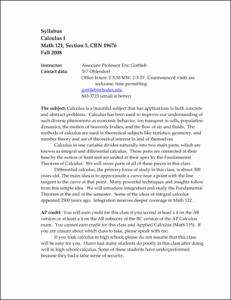Please use this identifier to cite or link to this item:
http://hdl.handle.net/10267/15677Full metadata record
| DC Field | Value | Language |
|---|---|---|
| dc.contributor.author | Gottlieb, Eric | - |
| dc.date.accessioned | 2013-02-27T17:50:04Z | - |
| dc.date.available | 2013-02-27T17:50:04Z | - |
| dc.date.issued | 2008-08-27 | - |
| dc.identifier.uri | http://hdl.handle.net/10267/15677 | - |
| dc.description | This syllabus was submitted to the Office of Academic Affairs by the course instructor. Uploaded by Archives RSA Josephine Hill. | en_US |
| dc.description.abstract | Calculus is a beautiful subject that has applications to both concrete and abstract problems. Calculus has been used to improve our understanding of such diverse phenomena as economic behavior, ion transport in cells, population dynamics, the motion of heavenly bodies, and the flow of air and fluids. The methods of calculus are used in theoretical subjects like statistics, geometry, and number theory and are of theoretical interest in and of themselves. Calculus in one variable divides naturally into two main parts, which are known as integral and differential calculus. These parts are connected at their base by the notion of limit and are united at their apex by the Fundamental Theorem of Calculus. We will cover parts of all of these pieces in this class. Differential calculus, the primary focus of study in this class, is about 300 years old. The main idea is to approximate a curve near a point with the line tangent to the curve at that point. Many powerful techniques and insights follow from this simple idea. We will introduce integration and study the Fundamental Theorem at the end of the semester. Some of the ideas of integral calculus appeared 2500 years ago. Integration receives deeper coverage in Math 122. | en_US |
| dc.language.iso | en_US | en_US |
| dc.publisher | Memphis, Tenn. : Rhodes College | en_US |
| dc.relation.ispartofseries | Syllabi CRN;19676 | - |
| dc.rights | Rhodes College owns the rights to the archival digital objects in this collection. Objects are made available for educational use only and may not be used for any non-educational or commercial purpose. Approved educational uses include private research and scholarship, teaching, and student projects. For additional information please contact archives@rhodes.edu. Fees may apply. | - |
| dc.subject | Syllabus | en_US |
| dc.subject | Curriculum | en_US |
| dc.subject | Academic departments | en_US |
| dc.subject | Text | en_US |
| dc.subject | Mathematics and Computer Science, Department of | en_US |
| dc.subject | 2008 Fall | en_US |
| dc.title | MATH 121-05, Calculus I, Fall 2008 | en_US |
| dc.type | Syllabus | en_US |
| Appears in Collections: | Course Syllabi | |
Files in This Item:
| File | Description | Size | Format | |
|---|---|---|---|---|
| 2008_FALL_MATH_121-05_19676.pdf | 347.84 kB | Adobe PDF |  View/Open |
Items in DSpace are protected by copyright, with all rights reserved, unless otherwise indicated.